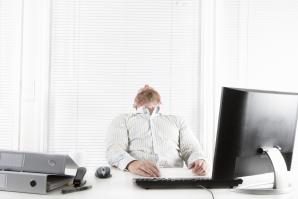Let me take a wild guess: You feel like you don’t get enough sleep. Too much to do, you’re stressed out and you think getting eight hours of sleep is about as realistic as keeping current on Oprah’s Book Club. Or maybe you’re annoyed that your body needs too much sleep? Think of all the workouts you could get in, books you could read and emails you could return with a few extra hours in each day. Wouldn’t we all love to train our bodies to require less sleep?
This isn’t just an idle question. In sleep labs across the country, scientists are conducting studies to better identify why we sleep, how it impacts our brain and whether, in fact, it’s possible to do more with less. We now know that sleep is crucial for regulating our hormones (which helps keep off the pounds), buttressing our immune system and keeping us from nodding off and crashing into buses. As Shawn Stevenson notes in the book Sleep Smarter, “After just 24 hours of sleep deprivation, there is an overall reproduction of 6 percent of glucose reaching the brain. Simple translation: You get dumber.”
We should be getting more sleep, not less. It would be irresponsible to suggest otherwise. That said, what can we do to train our bodies? We live in a world where, at the gym, high-intensity training can allow us to burn more fat in three minutes of sprints than we can in a 30 minute jog. Can we do the same with sleep?
The short answer is not really. If there were a miracle cure, you would have heard about it by now. But the more complicated answer is twofold: 1) All of us can improve our “sleep hygiene,” which, in turn, can boost the quality of our sleep, which might let us feel more refreshed even though we spend less time in bed. 2) It is possible to cross over into the dark side, where you can trick your brain into only needing two hours of sleep each day. There’s only one catch: It will likely destroy your life.
1. Think in terms of cycles, not hours.
“Eight hours is a myth,” says Dr. Michael Breus, who runs the blog thesleepdoctor.com and occasionally pops up as a sleep expert on The Dr. Oz Show. “Trying to find a single amount of time is really not the right idea. It’s more about the quality.” (And not everyone needs the same amount of sleep; less than 1 percent of the population is a “short sleeper,” which means these wired ones only need five hours a night.) Every night, we sleep in waves of 90-minute cycles. Stage 1 is a light sleep, so faint that you might not even know you’re sleeping. (Think: how you feel during the first act of an opera.) Stages 2, 3 and 4 get deeper and trigger more brain activity. Stage 5 is REM, the promised land. This is when you dream and the brain recharges the batteries. What counts is not the total number of hours we spend on the mattress, but the amount of time we soak in the glorious netherworld of REM. If you chronically get eight or more hours of sleep and feel like you’re not rested, it’s likely that you’re stuck in the warm-up stages of 1 or 2. One possible cause? Hormones.
2. Respect the hormones.
Behind our eye sockets, there’s a clump of cells that detects light or darkness, then zaps a message to your brain’s pineal gland to let it decide whether or not to pump out melatonin. “Like a parent singing nursery rhymes to a toddler, melatonin coaxes the body to fall asleep,” Randall explains. Hormones matter. Dr. Lydia Wyrtzes is a sleep specialist at Sacramento’s Sutter Health. “Melatonin stays pretty elevated throughout the night, and then it drops radically in the morning,” she says. We all dance to the cadence of our circadian rhythms, which is why we feel perky(ish) in the morning and droopy by midnight.
This is why laptops are sleep-killers. When it’s dark for a while, the pineal gland assumes it is bedtime and sends melatonin throughout the body to let the organs know that it is time to close up shop. But here’s the thing: “The pineal gland can be tricked pretty easily,” warns Randall. Every sleep expert recommends that we avoid TV, laptops and iPads at least an hour before bed. Ideally two hours.
It’s also important to get sunlight first thing in the morning. This tells the melatonin to simmer down, which helps enforce regularity in your circadian timing system. (Bonus hack: Many people swear by the Philips goLITE, a pocket-size gizmo that somehow replicates sunlight. It was designed to treat seasonal affective disorder, but if you’re changing time zones, you can use it to trick your body to stay on your normal sleep/hormone clock.)
3. Technically, you can’t bank sleep … but it feels like you can.
In sleep labs across the country, scientists are conducting studies to better identify why we sleep, how it impacts our brain and whether, in fact, it’s possible to do more with less. What counts is not the total number of hours we spend on the mattress, but the amount of time we soak in the glorious netherworld of REM.
One military study at Walter Reed found that when soldiers slept for extended hours before a subsequent period of sleep deprivation, they functioned better than those who didn’t get the early shut-eye. So is it possible to “save up” a surplus of sleep, and then draw from it when we’re crunched? Not exactly. Dr. Robert Dias, a neurologist and sleep specialist at the Mercy Sleep Center, tells me that “These soldiers likely began the experiment with a sleep debt, so they just got back to baseline.” We can learn from this. Many of us (raising my hand) have a chronic sleep debt, so if we know that we’re about to enter the maw of sleep deprivation — a red-eye flight to Europe, say — we can blunt the impact.
4. Think about a bedtime snack.
This one’s tricky. Too much food can tax your digestive system, but as Tim Ferriss describes when conducting sleeping experiments in The 4-Hour Body, he found the perfect balance with 2 tablespoons of organic almond butter on celery sticks. “Ever wonder how you can sleep eight to 10 hours and feel tired? The likely culprit: low blood sugar,” explains Ferriss. “Make a pre-bed snack part of your nutritional program.” He recommends 1 to 2 tablespoons of flaxseed oil with the celery and almond butter to further increase cell repair during sleep and decrease fatigue.
5. Give your screen a “blue light condom.”
Less risqué than it sounds. Telling you to not use any TV, laptops or iPads two full hours before bedtime is like telling college students to practice abstinence; it’s just not going to happen. So if you must use a laptop before bed, one option is to use an app like f.lux, which filters out the sleep-sucking blue lights from your screen.
6. Buy a plant.
Air quality impacts your sleep. Plants improve the quality of the air. Stevenson recommends the perennial snake plant, as it “absorbs carbon dioxide and releases oxygen during the night (while most plants do this during the day), so it’s the perfect plant to keep in your bedroom for an air-quality boost.”
7. No phones in the bedroom.
They’re sleep kryptonite. Not only do they pelt us with those melatonin-sucking blue lights, but they can spike our stress levels before, after and even during sleep. If we happen to wake up at 3 a.m., we’ll be tempted to check email or Facebook or Twitter. Several months ago, I banished my iPhone to the living room, bought an old-school alarm clock straight from the ’80s, and after about five days of withdrawal, the quality of my sleep immediately improved. It’s one of the only truly great decisions of my life.
8. Exercise (but not before bed).
Exercise is good for our hormones and therefore our sleep, but timing matters. One study split volunteers into three groups — one exercised at 7 a.m., another at 1 p.m., and the third at 7 p.m. — then monitored their sleep and found that the morning crew slept longer and better. As Stevenson explains, “One of the big issues with working out late in the evening is that it significantly raises your core body temperature, and it can take upward of five to six hours for it to come down again.”
9. Wake up at the same time … even if it’s painful.
“The way to hack yourself into entering REM sleep without being exhausted is to trick your body into thinking you’re going to get a tiny amount of sleep.”
Tim Ferriss, author, The 4-Hour Body
“Going to bed and waking up at the same time regularly is absolutely critical for having good, quality sleep,” Dr. Breus says. “It’s the anchor of the whole thing. If you exercise, avoid caffeine and keep a regular schedule. You don’t need eight hours to get a good night’s sleep.” In practical terms, this means that even if you feel like dogmeat on a Saturday morning, you’re still better off waking at your normal hour. This keeps the circadian timing system in check.
10. The Dark Side: Polyphasic Sleep
Remember that classic Seinfeld episode, where Kramer decides that he will sleep like Leonardo Da Vinci and take a 20-minute nap every three hours? Legend has it that Thomas Edison and Nikola Tesla did the same thing.
A complete myth? Maybe not.
I was surprised when Dr. Breus told me that for some people, it can actually work. The richest benefits of sleep come in the REM stage, which only lasts about 20 minutes. The goal of polyphasic sleep is to trim the fat of stages 1, 2, 3 and 4, and then only sleep during REM. “The way to hack yourself into entering REM sleep without being exhausted is to trick your body into thinking you’re going to get a tiny amount of sleep,” explains Ferriss. “You can train it to enter REM for short periods of time throughout the day in 20-minute naps rather than in one lump at night.”
In 1999, while in college, a woman who goes by the internet pseudonym “Puredoxyk” attempted the Kramer schedule. Fourteen friends joined her. Twelve of them failed. But she kept at it, and after the initial week of fatigue, as she blogs on her journal, “We felt like superman. Extracurricular activities? No problem. Part-time jobs? Easy. And we STILL went to nearly every party. My dorm room was spotless, I got lots done on my writing, and studying was a cinch when you could do it at Denny’s between 4 and 8 a.m.” Her routine became known as the Uberman sleep schedule and she inspired something of a cult following on the website polyphasicsociety.com, where others share their challenges and sleep triumphs.
I wanted to try this. I love goofy experiments, and this seemed right up my alley. But then I learned about the catch. Even if you survive the punishing introductory period, every day, for as long as you do it, you must stick exactly to your nap schedule — 2 a.m., 6 a.m., 10 a.m., 2 p.m., 6 p.m., 10 p.m. — and if you miss even one nap, or if you oversleep, you’re toast.
And that’s the real problem with the Uberman schedule: It’s almost impossible to square with an actual life. “You have to destroy your clock down to nothing, and then reprogram it,” says Dr. Wytrzes. “It just doesn’t make a lot of sense to me.” And while it may work anecdotally, there have not been any large, longitudinal studies that assess the downstream health impact. What are the consequences in a decade? (Let’s not forget how the Kramer episode ends: After falling asleep making out with his mob-connected girlfriend, he’s stuffed in a body-bag and thrown in the river.)
A toned-down version of this schedule is called the Everyman, which lets you sleep three to four hours at night and then take three naps during the day. Or you could adopt the siesta model, which is roughly six hours at night plus a 90-minute nap in the afternoon.
I’m tempted. I really am. I love the concept of having six extra hours a day to write, read, practice my tennis serve at 4 a.m. or finally make it through a Ken Burns documentary. The next time I find myself without any meetings, deadlines, friends or responsibilities, I’m totally doing this.
In the meantime, I’ll just buy a plant.
Recommended For You

Death by Desk Chair
How to combat our national sitting epidemic
Those long hours you’re logging at your desk may be taking a physiological toll that your morning run and bike commute can’t quite undo. We’re in the midst of a sitting epidemic that comes with some pretty scary health implications, but a simple change in our corporate culture might hold the key to better fitness for us all.

Daddy Issues
Why aren't more men taking paternity leave?
On opening day of the 2014 baseball season, New York Mets second baseman Daniel Murphy was noticeably absent. He wasn’t benched. He didn’t have the flu. He simply took advantage of Major League Baseball’s paternity leave policy, which grants 72 hours off, to attend the birth of his son.
And all hell broke loose.

Juiced
Bowel Formula No. 2, friend or foe?
It’s a seductive pitch: Cleanse your body. Feel healthy. Lose weight.
You only have to do one thing: starve.

Sleep It Off
Why taking a nap would be more valuable than reading this article
I have an especially stupid case of insomnia, but we as a society are rotten sleepers and I’m not alone. Since doctors recommend seven to eight hours a night, about half the population is sleep deprived. We’re a nation of walking zombies.



